Kia details EV5 and previews affordable EVs, none yet US-bound

Kia on Thursday hosted its first Kia EV Day outside of Seoul, where the South Korean company shared specifications on its EV5 electric compact crossover, which was revealed in August, and unveiled two electric concept vehicles.
All three vehicles will make it to production, and they are intended to make Kia electric vehicles accessible to more people. Kia said they’ll be priced at $35,000-$50,000.
American sales are less certain, though. In a statement, the company said, “Kia is considering to export the EV5 to North America starting from 2025. There is no plan to produce the EV5 in North America.”
U.S. public relations representatives intimated that the EV5 will come to Canada and not the U.S. as the company has another product planned for that compact-to-midsize electric crossover market. We suspect it will be an as-yet-revealed EV7.
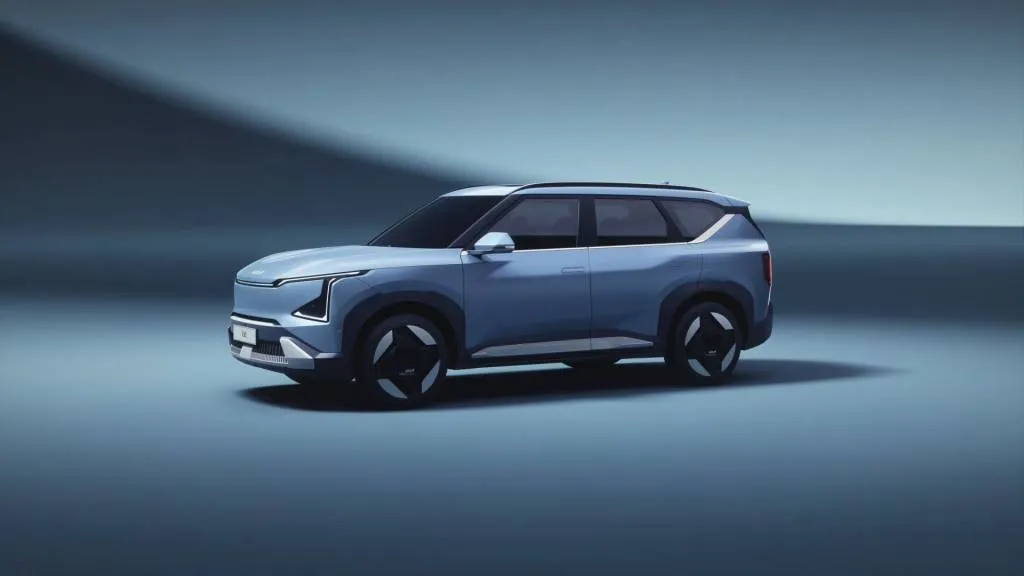
Kia EV5
Production versions of the EV3 and EV4 may come to our shores, but the brand is still evaluating if they’re right for the market. Kia also confirmed a fourth vehicle, the EV2, as a lower-priced option for Europe and emerging markets. It would likely start at about $30,000, though Kia gave no other information about its size or form factor.
All three of the vehicles shown will ride the E-GMP platform that also serves the EV6 and EV9, as well as the Hyundai Ioniq 5 and 6 and the Genesis GV60.
Employing the brand’s Opposites United design language, the EV5 closely follows the EV5 concept vehicle shown earlier in the year and looks like a shorter version of the attractive EV9. Compared to the existing gas lineup, it’s about two inches shorter than the Sportage.
Kia said the EV5 will be built in China and South Korea, and gave some specs for each. Both countries will get standard, long-range, and long-range AWD versions. For China, the standard model will have a 64-kwh battery, a 214-hp front motor, and 329 miles of range on China’s Combined Charging and Load (CLTC) cycle—a cycle that doesn’t directly compare to the EPA cycle but tends to result in a number 20-40% higher.
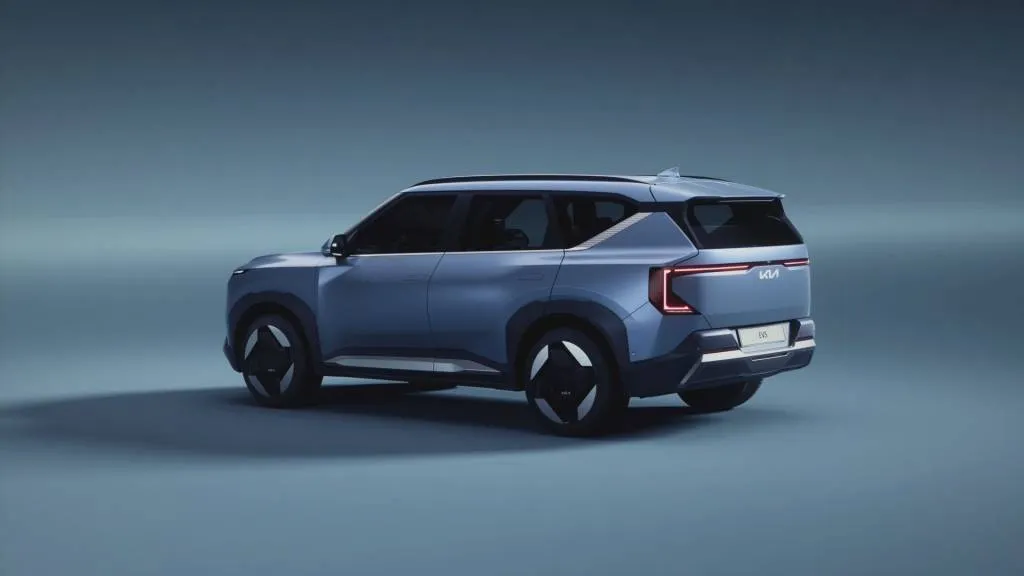
Kia EV5
The AWD version will get the same motor with an 88-kwh battery and 447 CLTC miles of range. The long-range AWD version will add a 93-hp motor at the rear and offer 404 CLTC miles of range.
Korean market versions will have slightly smaller batteries, 58-kwh for the standard model and 81-kwh for the others. The 93-hp motor at the rear will up the total output to 261-302 hp. With a 400-volt electrical system (so far, Kia EVs have had an 800-volt architecture), these vehicles will be able to charge from 30-80% in 27 minutes at a rate of more than 140 kw. A standard heat pump will also manage battery temperature to keep its performance consistent. Kia is also working on vehicle-to-load and vehicle-to-grid functions for the battery to power external electric devices and send power back to the grid, respectively.
The EV5 will come with an adjustable i-Pedal system that will allow for multiple stages of regeneration, including one-pedal driving. Later, Kia will add a GT model, likely with more power and sportier suspension tuning, a la the EV6 GT.
Inside, the EV5 has a Panoramic Wide Display with a 12.3-inch digital instrument cluster, a 12.3-inch center touchscreen, and a 5.0-inch climate control display. Physical buttons are few, and four hidden hard keys under the center screen will handle some controls. The system will be capable of over-the-air updates and includes readouts for EV range and charging. A head-up display will be optional. Options, including for performance, will also be available over the air.
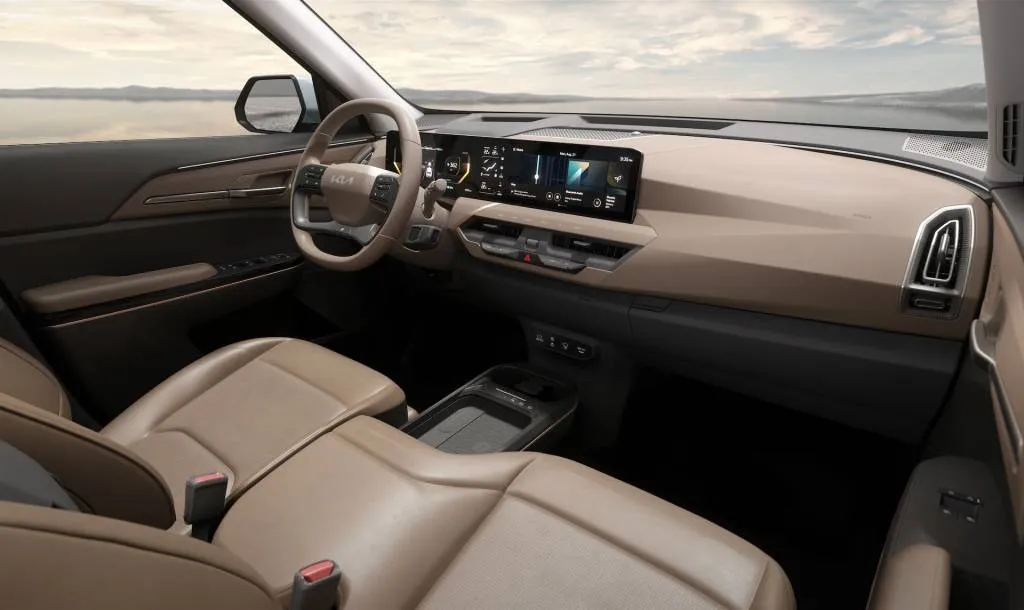
Kia EV5
Seating will include a front bench seat for the Chinese market, as well as two levels of massaging front seats with heating and cooling. Buyers will have the choice of recycled PET fabric or synthetic leather upholstery. The rear will offer a camping seat that will fold fully flat. A rear refrigerator and warmer will also be available.
Available safety features will include remote automatic parking, an exit warning system, and a Highway Driving Assist 2 feature that keeps the car centered in its lane, changes lanes, and acts as adaptive cruise control.
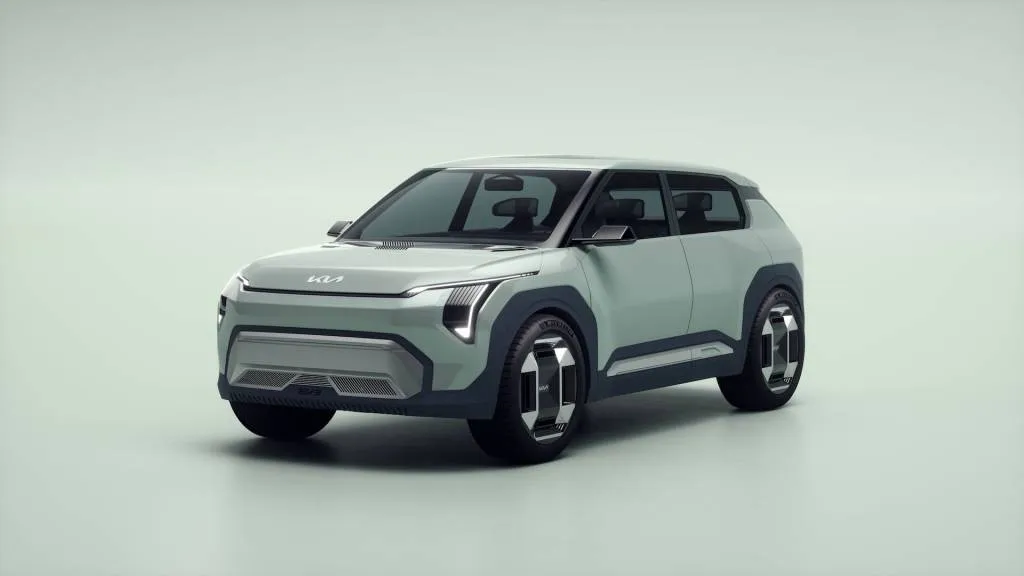
Kia EV3 concept
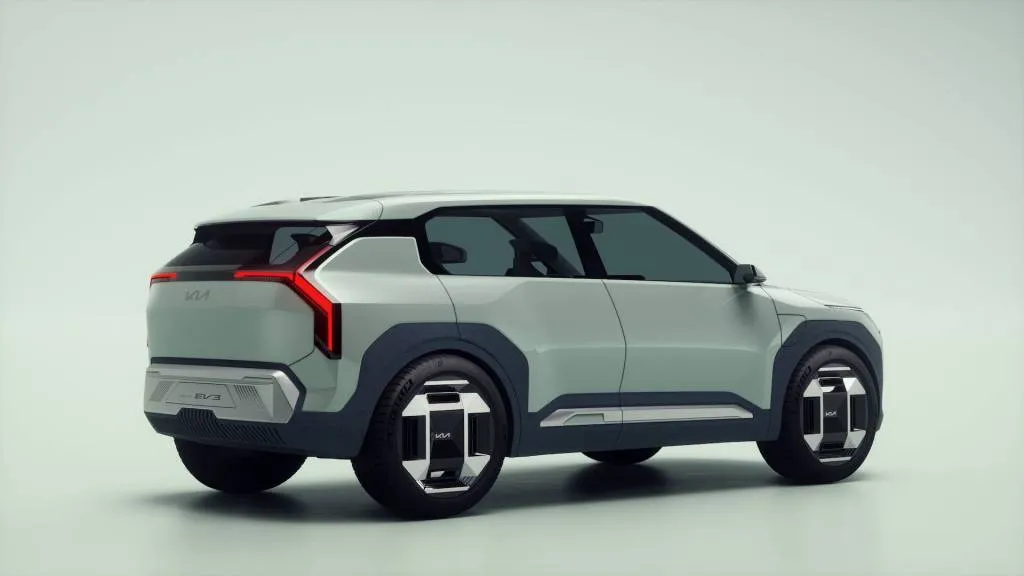
Kia EV3 concept
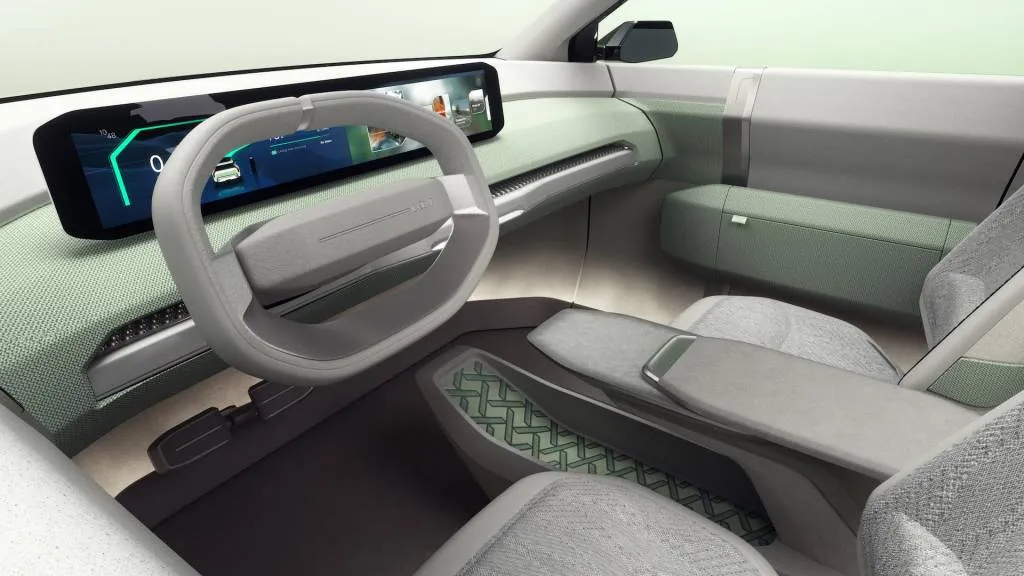
Kia EV3 concept
Kia Concept EV3: A smaller and more affordable crossover
Like the EV5, the Concept EV3 crossover takes its design cues from the larger EV9. Kia didn’t give dimensions, but it appears subcompact to compact size, along the lines of the Seltos. The design features a wraparound windshield pushed forward, floating C-pillars, the geometric shapes from the EV9, and rear coach doors. Kia’s design boss Karim Habib said the design of both concepts is close to production, though likely not including those coach doors.
Inside, the EV3 also uses recycled materials, as well as mood lighting. It also features mini tables that move forward and back to serve both seating rows. Also inside is a port for V-to-L charging of things such as small electric bikes or scooters that could be carried in the second row thanks to rear seat bottoms that fold upward.
Kia has provided no information on the EV3’s powertrains or battery sizes. It would likely be the cheapest of the Kia EVs, starting at $30,000-$35,000, depending on the market. Kia did say it will be offered as a 2024 model, but didn’t say in which markets.
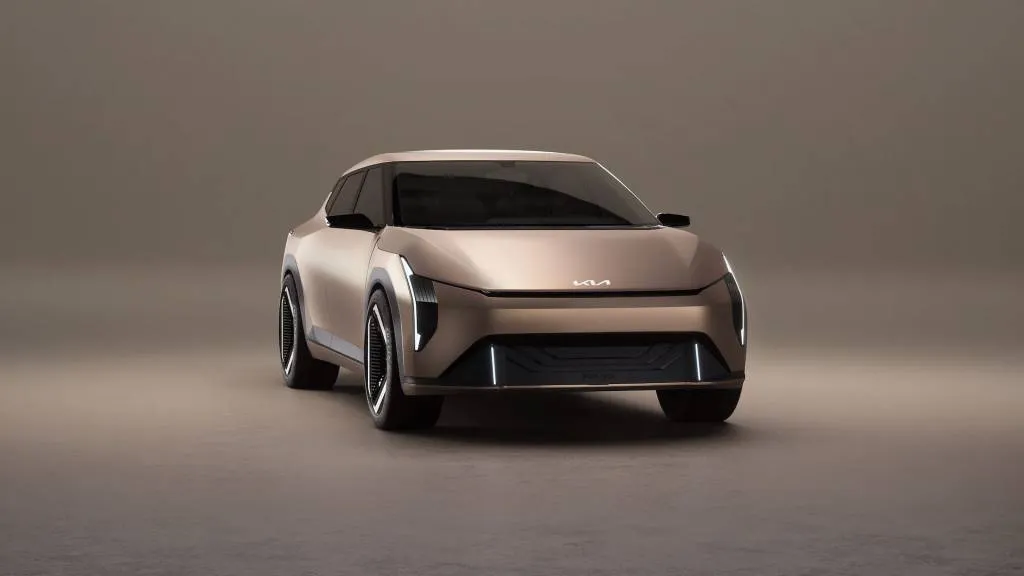
Kia EV4 concept
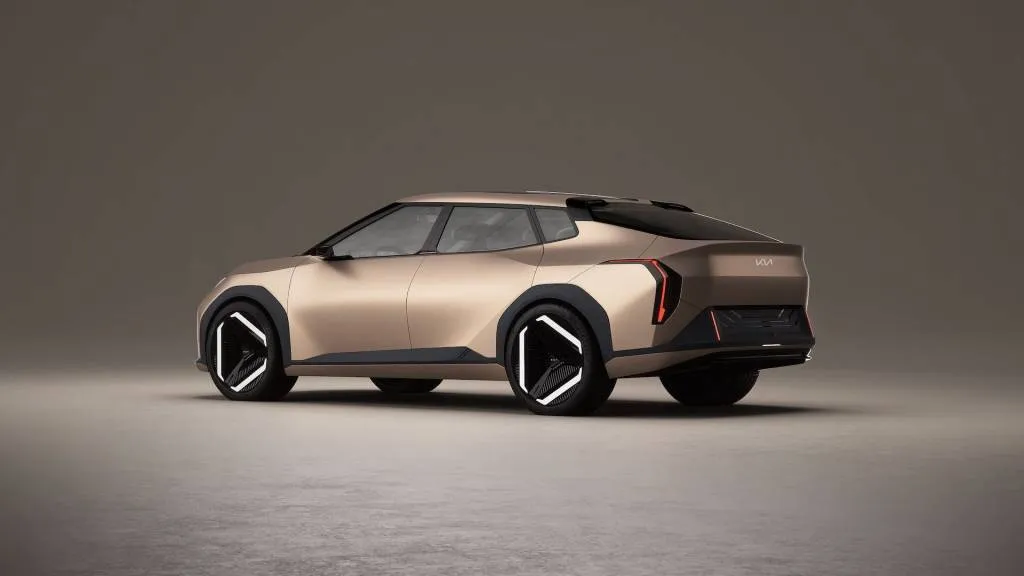
Kia EV4 concept
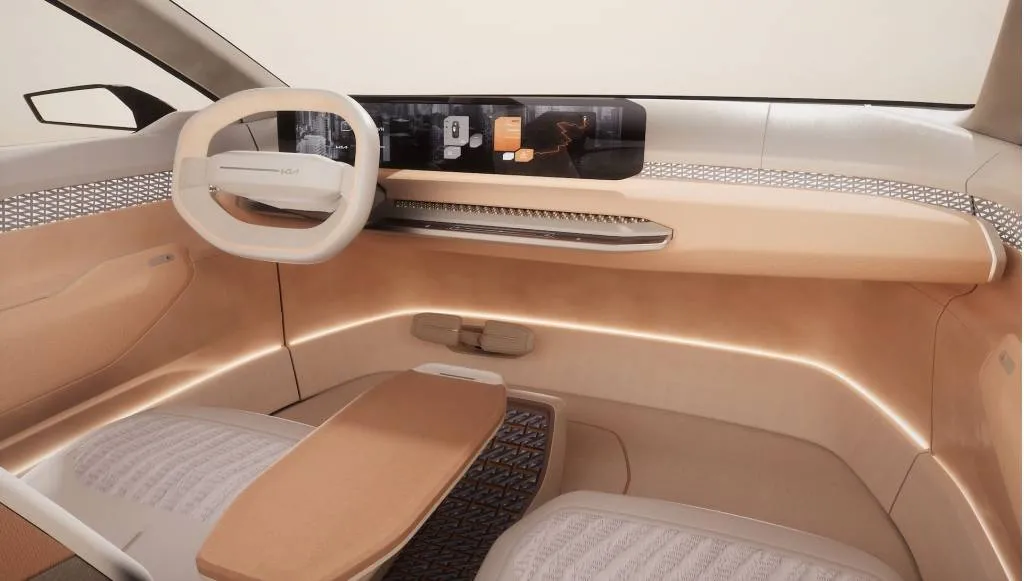
Kia EV4 concept
Kia Concept EV4: A four-door hatchback with crossover cues
Kia’s final EV Day debut was the EV4, a four-door hatchback with a very different look—a sort of Tesla Cybertruck for the car market. Its design sports an elongated rear end, a low nose, a windshield moved forward, a wide stance, and a roof spoiler. It also incorporates cues from the other EV models, namely the geometric shapes and wider lower proportions, as well as some SUV cues, including a raised seating position and dark cladding on the lower body and wheel flares. The look is polarizing, and not in any way as elegant as the brand’s current gas-powered sedans.
Inside, it has digital screens for the instrument cluster and center screen, an air conditioning control panel that stores in the center stack, and pin-style air vents that can change their airflow patterns. A Mind Modes feature adjusts the ambient lighting and ventilation patterns, while a Serenity mode uses digital graphics to create a relaxing experience.
Like the Concept EV3, Kia provided no powertrain or size information for the Concept EV4, though it appears to have midsize car proportions.
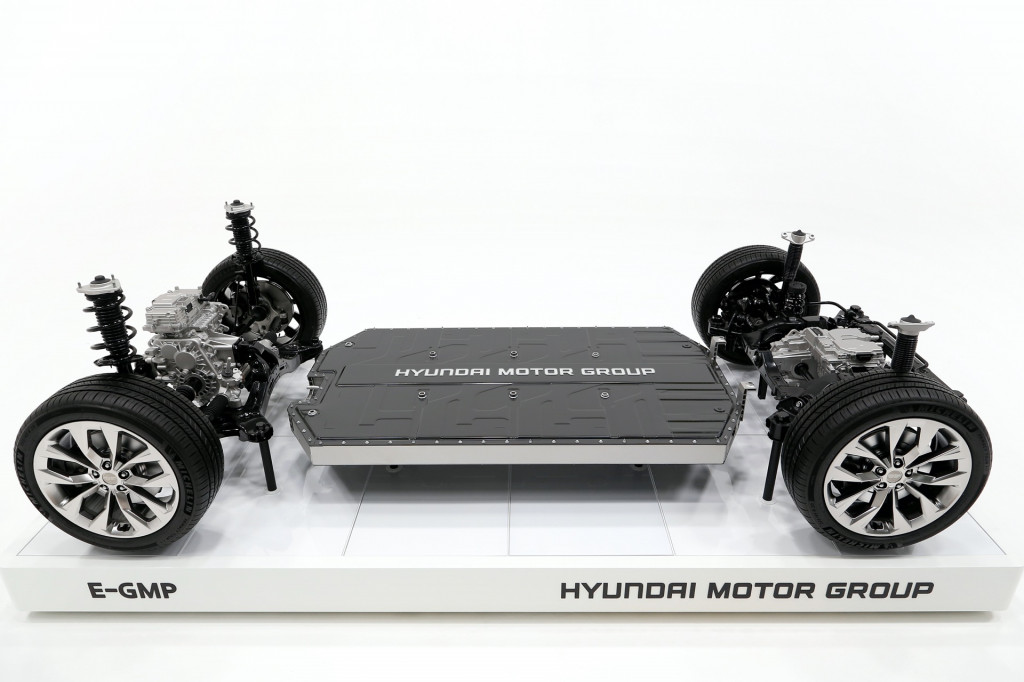
Hyundai Motor Group E-GMP platform
Kia EV charging and customer experience
Kia shared that its goal is to sell 1 million EVs globally by 2026 (or 25% of its global sales) and 1.6 million by 2030 (or 37%). To aid this goal, the company is working to establish a reliable system for EV production and battery supply, aiming to expand its global EV production facilities to a total of eight by 2025, including battery joint ventures.
Kia reiterated that in the U.S. it is switching to Tesla’s North American Charging Standard in the fourth quarter of 2024—a move it announced last week just minutes after Hyundai and Genesis gave NACS the nod. The move will give Kia customers access to 12,000 Tesla Superchargers. Kia also previously announced it is collaborating with BMW, GM, Hyundai, Mercedes, Honda, and Stellantis to build 30,000 fast-charging stations across North America by 2030.
Kia will also release a new Kia App in the first half of 2024. It will let customers set up test drives, research vehicles, and even finalize contracts. The app will offer a routing function that will suggest the best route based on battery charge level and available charging stations on the route. Customers will also be able to monitor charging status from the app.
Finally, Kia said it plans to set up EV stores in the U.S., though no timing was announced. Kia wouldn’t confirm this means going away from the dealer model and selling directly to customers, but only said it is studying how to bring the EV experience closer to customers.